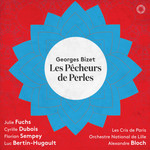|
Back
06/03/2018
Georges Bizet: Les Pêcheurs de perles (1863 première version)
Julie Fuchs (Léïla), Cyrille Dubois (Nadir), Florian Sempey (Zurga), Luc Bertin-Hugault (Nourabad), Les Cris de Paris, Geoffroy Jourdain (conductor), Orchestre National de Lille, Alexandre Bloch (conductor)
Live recording: Nouveau Siècle de Lille, France (May 9-11, 2017) – 109’42
Pentatone # SACD PTC 5186 685 (Distributed by Naxos of America) – Booklet in English and French

   
As a rule of thumb, visual productions protract composer’s music with maximization, such as Zandra Rhodes’ eye-popping brilliance of Les Pêcheurs de perles in 2008 by San Diego Opera or last year’s Dick Bird tin-roofed shanty production in Los Angeles, but Pentatone’s latest concert capture of Les Pêcheurs des perles has its own pearly qualities. Bizet’s seventh opera premiered in 1863, yet the curtain raised and dropped at the Théâtre Lyrique for only 18 performances. Since then, the opera has undergone a flurry of reworks, the latest one as recently as 2002 by Brad Cohen in an expository Urtext edition. Because Les Pêcheurs des perles’ autograph is privately owned, Pentatone dutifully turned to the next closest rendition by Hugh MacDonald from 2014.
This œuvre has oceanic richness because of the graduating development of four principals in a reflection of the twisting, though simplified plot. Nowhere do we find the “voice box” more meaningful than in this Les Pêcheurs de perles as a way to ponder human emotions: love, torment, sorrow, anger and demise.
Julie Fuchs’ soprano timbre fits like a glove within Bizet’s score, and she has unparalleled silky endowments while artfully grasping the action of the moment. The voice is assured and controlled, and the listener is bathed inside her pristine accuracy. The cavatine, “Comme autrefois”, is a creamy, crystalline remembrance: she pinches the sky with amiable cognizance along with a riddling of delectable grace notes. A “turn-on-the-dime”, however, she pliably repositions her stance when pursuing another level of heightened confrontation.
One of the most memorable equations dwells inside “O lumière sainte”, draped inside a richly hued harp accompagnato while pulsating to the surface against the irresistible outreaches of tenor Cyrille Dubois. Pentatone’s acoustical engineering is to be applauded in the way Nadir’s distant voice gradually becomes more cleanly delineated until he’s united onstage with Léïla, in time for the love duet, “De mon amie”: this is one of many examples where sound approach becomes so vitally important and effectively stimulating for this opera.
Florian Sempey coordinates his baritone register with unquestionable bravado, and it stands in the strongest domain. With its plaintive bassoon and oboe lead-in, his aria, “L’orage s’est calmé”, is well developed, cleanly grappling with his earlier edict and ultimately relinquishing such a sentence. Stalwart commands can be heard through the impressionable bass voice of Luc Bertin-Hugault as the Grand Priest, Nourabad: M. Bertin-Hugault gives Bizet’s music a suitably stern degree of friction and conflict.
Underestimated in the past, Les Pêcheurs de perles is an opalescent treasure, especially when considering Bizet was only age 24 when he completed the work. Going back a step or two, the luminescence actually begins with Alexandre Bloch’s conducting and the polished Orchestre National de Lille. Emphatic accolades go to the squeaky clean woodwinds (i.e. piccolo and flute) and the bevy of horn entrées. Pacing is “on the mark.”
One of the greatest treats is listening to Bizet’s deft technique of the offstage chorus...a carry-forward of Meyerbeer’s days. Act II’s opening pulsates with energy and momentum...the soft choral responses harken back to Bizet’s failed grand opéra, Ivan IV.
Staged within Lille’s Nouveau Siècle, this Pentatone recording has a phenomenal depiction of French romantic opera. Superlative in audio airwaves and colored dynamics. A strong recommendation.
Christie Grimstad
|